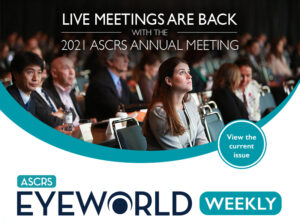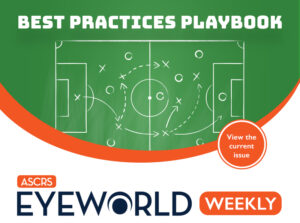FDA 510(k) clearance granted to FLACS system
LENSAR announced 510(k) clearance by the FDA for its ALLY Adaptive Cataract Treatment System, which is designed to perform the entire FLACS procedure in a single, sterile setting, according to the company’s press release. ALLY, the press release continued, fits into any operating room or in-office surgical suite. It includes the company’s Adaptive Intelligence technology, which can determine cataract density to optimize fragmentation patterns and energy settings. It also includes advanced astigmatism management technology, the press release stated.
New genetic eye disease discovered
The National Eye Institute (NEI) announced that a new genetic eye disease affecting the macula has been identified. The macular dystrophy, which was described in the journal JAMA Ophthalmology, has not yet been named. The researchers identified two new TIMP3 variants through clinical evaluations and genetic testing. According to one of the researchers, affected patients had scotomas, changes in their maculas but preserved central vision and no choroidal neovascularization.
Primary endpoint met in Phase 3 trial for dry eye drug candidate
Aldeyra Therapeutics announced that the primary endpoint was met in its Phase 3 clinical trial of reproxalap for treatment of dry eye disease. Reproxalap, according to the company, was superior to vehicle in Schirmer testing and achieved a 10 mm or more Schirmer test responder proportion after a single day of dosing. Aldeyra plans to submit an NDA to the FDA with ocular dryness symptom score, ocular redness, Schirmer test, and the responder analysis. The company’s press release stated that it plans to hold a Type B Pre-NDA meeting with the FDA in the third quarter of 2022 followed by the potential NDA submission, pending enrollment in the ongoing 12-month safety trial and results from its dry eye chamber crossover trial.
New analysis of thyroid eye disease therapy
Horizon Therapeutics announced new analysis of its Phase 2 and Phase 3 clinical trials of TEPEZZA (teprotumumab-trbw) for treatment of thyroid eye disease. This new analysis looked at the rates of hyperglycemia among patients treated with the drug compared to placebo. According to the company’s press release, nine adverse events related to hyperglycemia were reported in eight patients who received TEPEZZA and one who received placebo. Five of these eight patients had pre-existing diabetes. The hyperglycemic events, when they occurred, were controlled with medicine, the company reported, and none of the events led to discontinuation in the study. The hemoglobin A1C levels increased 0.22% in patients treated with TEPEZZA compared to 0.004% in patients treated with placebo in the studies, the company’s press release reported.
Licensing agreement for commercialization of investigational myopia therapeutic
Vyluma and Laboratoires Théa entered into an exclusive licensing agreement for the registration and commercialization of NVK002, an investigational, preservative-free drop for slowing the progression of myopia in pediatric patients ages 3–17. According to the company’s press release, the drop is in a Phase 3 clinical trial being conducted at multiple centers in the U.S. and Europe. The licensing agreement for the registration and commercialization of NVK002 with Théa includes Canada, Mexico, and some South American countries, expanding a prior agreement among the countries for commercialization in Europe and other select countries, the press release stated.
ASCRS news and events
- ASCRS Summer Meeting: Register for the ASCRS Summer Meeting and get a “Taste of ASCRS” over a long weekend, August 19–21, 2022, in Nashville, Tennessee.
- ASCRS Grand Rounds: Watch the latest ASCRS Grand Rounds, presented by the University of California San Diego, Shiley Eye Institute, online now as an ASCRS member benefit.
- Ophthalmology Quicksand Chronicles: Log in to watch the latest episode of this popular ASCRS podcast hosted by Nicole Fram, MD, and Elizabeth Yeu, MD.
- New issue online: Read the June issue of EyeWorld.
Research highlights
- A randomized clinical trial of more than 23,500 U.S. adults evaluated the effect of marine omega-3 fatty acids on the prevention of dry eye disease. The study published in JAMA Ophthalmology included patients who at the outset did not have a diagnosis of dry eye disease and were not experiencing severe dry eye symptoms. After a median of 5.3 years of treatment with 1 g per day of marine omega-3 fatty acids or placebo, the study authors reported that there was no difference in dry eye diagnosis based on supplement use. There was also no difference between the groups in the incidence of severe dry eye disease symptoms. The authors concluded that the results “do not support recommending marine omega-3 fatty acid supplementation to reduce the incidence of [dry eye disease].”
- Endothelial cell loss after endocapsular (divide-and-conquer) or subluxation supracapsular phacoemulsification techniques were evaluated in a randomized, single-blind, non-inferiority clinical trial published in the journal Cornea. According to the paper, 292 patients (mean age 73 years) were included in the analysis—148 had a subluxation supracapsular phaco technique while 144 had a divide-and-conquer technique. Patients were followed up with on day 4 and months 1, 3, and 12. The authors reported an “unexpectedly high dropout at 12 months” and, as such, the 12-month endothelial cell loss data could only be assessed qualitatively. The authors concluded that the subluxation supracapsular technique was non-inferior to the divide-and-conquer when it came to postop endothelial cell loss within the first 3 months. It was also associated with reduced intervention time. “Subluxation techniques may be suitable alternatives to endocapsular techniques,” the authors reported.
This issue of EyeWorld Weekly was edited by Stacy Jablonski and Liz Hillman.
EyeWorld Weekly (ISSN 1089-0319), a digital publication of the American Society of Cataract and Refractive Surgery (ASCRS), is published every Friday, distributed by email, and posted live on Friday.
Medical Editors: Sumit “Sam” Garg, MD, Chief Medical Editor; Rosa Braga-Mele, MD, Cataract Editor; Clara Chan, MD, Cornea Editor; Nathan Radcliffe, MD, Glaucoma Editor; and Vance Thompson, MD, Refractive Editor
For sponsorship opportunities or membership information, contact: ASCRS • 12587 Fair Lakes Circle • Suite 348 • Fairfax, VA 22033 • Phone: 703-591-2220 • Fax: 703-591-0614 • Email: ascrs@ascrs.org
Mention of products or services in EyeWorld Weekly does not constitute an endorsement by ASCRS.
Click here to view our Legal Notice.
Copyright 2022, EyeWorld News Service, a division of ASCRSMedia. All rights reserved.



